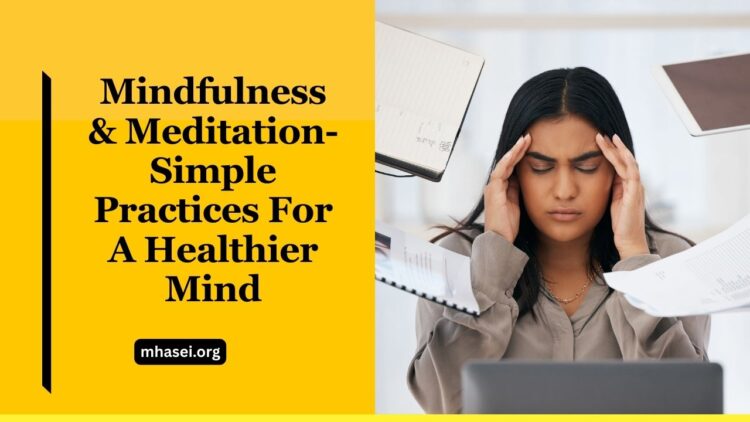In today’s busy and stressful world, more people are turning to mindfulness and meditation as natural ways to improve their mental health, focus, and emotional balance. These practices are simple, cost-free, and can be done anywhere—whether at home, at work, or even while walking outside.
Mindfulness is about paying attention to the present moment without judgment, while meditation involves training the mind to focus and build awareness. Together, they can reduce stress, boost mood, improve sleep, and even enhance overall brain health.
What Are Mindfulness and Meditation?
- Mindfulness is the ability to focus on what is happening right now, such as your breathing, thoughts, or surroundings, without getting carried away by worries.
- Meditation is a structured way of practicing mindfulness, often by sitting quietly, closing your eyes, and focusing on your breath, body, or a positive phrase.
These practices are used in modern wellness programs, therapy, schools, and even workplaces to help people lead healthier and more balanced lives.
Benefits of Mindfulness and Meditation
Practicing mindfulness and meditation regularly has many proven benefits:
- Reduces Stress and Anxiety: Calms the nervous system and lowers stress hormones.
- Improves Sleep Quality: Helps relax the body and quiet racing thoughts.
- Boosts Focus and Concentration: Strengthens attention span and memory.
- Supports Emotional Health: Reduces feelings of sadness, irritability, and burnout.
- Improves Physical Health: Can lower blood pressure, improve heart health, and reduce fatigue.
- Increases Self-Awareness: Helps people notice negative thought patterns and replace them with healthier ones.
Simple Daily Practices for a Healthier Mind
1. Mindful Breathing
Sit comfortably, close your eyes, and take slow, deep breaths. Focus on the feeling of air moving in and out of your body. If your mind wanders, gently bring it back to your breath.
2. Body Scan Meditation
Lie down or sit comfortably. Slowly bring your attention to different parts of your body, from your toes to your head. Notice sensations like warmth, tension, or relaxation.
3. Mindful Walking
Walk slowly and focus on each step. Notice how your feet touch the ground and how your body moves. This is perfect for people who find it hard to sit still.
4. Loving-Kindness Meditation
Silently repeat phrases like “May I be happy, may I be healthy” and extend them to loved ones, friends, and even strangers. This practice boosts positivity and compassion.
5. Noting Practice
Whenever distracting thoughts arise, label them as “thinking,” “worrying,” or “planning,” and gently return to your focus point.
Quick Comparison of Practices
| Practice | How to Do It | Time Needed | Best For |
|---|---|---|---|
| Mindful Breathing | Focus on slow, deep breaths | 5–10 minutes | Stress & anxiety relief |
| Body Scan | Notice sensations from toes to head | 10–20 minutes | Relaxation & better sleep |
| Mindful Walking | Focus on each step while walking slowly | 5–15 minutes | Improving focus & calmness |
| Loving-Kindness | Repeat positive phrases for self & others | 5–10 minutes | Boosting compassion & mood |
| Noting Practice | Label thoughts and return to focus | 5–10 minutes | Mental clarity & awareness |
How to Start and Stick With It
- Start Small: Begin with 5 minutes daily and slowly increase.
- Pick a Regular Time: Morning or bedtime works best.
- Use Daily Triggers: Link meditation to habits like brushing teeth or having coffee.
- Stay Consistent: Even short practices daily give better results than long sessions once a week.
- Be Patient: Changes in mood, sleep, and focus often appear after a few weeks of steady practice.
Why Mindfulness Matters in Modern Life
Modern lifestyles often involve constant notifications, busy schedules, and high stress. This leads to burnout, poor concentration, and emotional fatigue. Mindfulness acts like a reset button, helping people respond to challenges calmly instead of reacting with anger, fear, or worry.
Companies, schools, and even hospitals are now including mindfulness training to help students, workers, and patients live better and healthier lives.
Mindfulness and meditation are simple yet powerful tools to build a healthier, calmer, and more balanced life. By starting with just 5–10 minutes a day, anyone can reduce stress, improve focus, sleep better, and enjoy more emotional stability.
The key is not perfection, but consistency—making mindfulness a daily habit that supports long-term mental and physical health.
FAQs
How long should I meditate daily?
Even 5–10 minutes a day can bring results. Over time, you can increase to 15–30 minutes for deeper benefits.
Do I need special equipment to practice mindfulness?
No. You only need a quiet space, comfortable posture, and willingness to focus.
Can mindfulness help with sleep problems?
Yes. Practices like body scans and breathing exercises help relax the body and quiet the mind, making it easier to fall asleep




